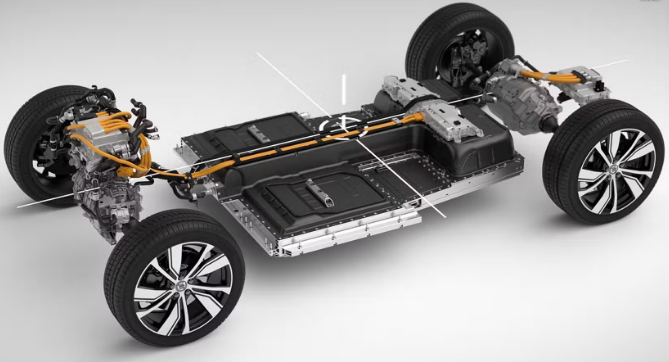https://en.wikipedia.org/wiki/Electric_vehicle_batteryAs an electric vehicle (EV) owner, you’re likely curious about the durability of your electric car battery and the factors that influence its lifespan. Understanding the lifespan of your EV battery is crucial for maximizing its longevity and overall performance.

The actual lifespan of your electric car battery depends on various factors, including charging habits, environmental conditions, and driving patterns. Efficient charging practices and moderate environmental conditions can significantly impact your battery’s health.
Key Takeaways
- Electric car batteries are designed to last for many years.
- Charging habits and environmental conditions affect battery lifespan.
- Proper maintenance can maximize battery longevity.
- Driving patterns also influence the durability of your EV battery.
- Understanding your battery’s needs is key to its health.
How Long Does an Electric Car Battery Last?
Understanding how long an electric vehicle (EV) battery lasts is crucial for making informed purchasing decisions. The lifespan of an electric car battery can vary significantly based on several factors, including the type of battery, driving conditions, and charging habits.
Average Lifespan Expectations
On average, most electric car batteries are expected to last between 8 to 15 years. This wide range is due to the various factors that influence battery longevity, such as the battery’s chemistry, the vehicle’s make and model, and how the vehicle is used and maintained.
Battery lifespan can be affected by how often you charge your vehicle and how deeply you discharge the battery. For instance, frequent fast charging can impact battery health over time.
Manufacturer Warranties and Guarantees
Many electric vehicle manufacturers provide warranties for their batteries, typically ranging from 8 years to 100,000 miles or more. These warranties offer peace of mind, as they cover repairs or replacements if the battery’s capacity falls below a certain threshold during the warranty period.
For example, some manufacturers guarantee that their EV batteries will retain at least 70% of their original capacity after 8 years or 100,000 miles. Understanding these warranties is essential for assessing the long-term value of your electric vehicle.
| Manufacturer | Warranty Period | Minimum Capacity Guarantee |
|---|---|---|
| Tesla | 8 years / Unlimited miles | 70% |
| Chevrolet | 8 years / 100,000 miles | 60% |
| Nissan | 8 years / 100,000 miles | 70% |
Real-World Performance Data
Real-world data indicates that many EV batteries retain up to 90% of their capacity after 8 years, suggesting that they can last longer than the warranty period. Studies have shown that factors such as moderate climates and careful charging habits can contribute to longer battery life.
As the electric vehicle market continues to evolve, understanding the factors that influence battery longevity will become increasingly important for both consumers and manufacturers.
Factors Affecting Electric Vehicle Battery Longevity
Understanding the factors that affect electric vehicle battery longevity is crucial for maximizing its lifespan. Several elements can influence how long your electric car battery will last, and being aware of these can help you take steps to prolong its life.
Charging Habits and Battery Cycles
Your charging habits play a significant role in determining the longevity of your electric vehicle’s battery. Frequent fast charging, for instance, can cause more wear on the battery than standard charging. Additionally, letting your battery completely drain on a regular basis can also affect its lifespan. It’s recommended to keep your battery level between 20% and 80% if possible, as this can help minimize stress on the battery.
Temperature and Climate Considerations
Temperature and climate conditions are another crucial factor in electric vehicle battery longevity. Extreme temperatures, either hot or cold, can degrade battery health over time. For example, leaving your electric vehicle in direct sunlight or in freezing temperatures for extended periods can impact its battery performance. To mitigate this, many electric vehicles come equipped with thermal management systems to regulate battery temperature.
Driving Patterns and Usage
Your driving patterns and usage also significantly influence your electric vehicle’s battery durability. Aggressive driving, such as rapid acceleration and braking, can put additional stress on the battery, potentially reducing its lifespan. Similarly, frequent stop-and-go traffic can also impact battery health. Smooth, moderate driving is generally recommended to preserve battery life.
Battery Chemistry and Technology
The type of battery chemistry and technology used in your electric vehicle also affects its overall longevity. Different manufacturers use various battery chemistries, such as lithium-ion or nickel-manganese-cobalt, each with its own characteristics and lifespan expectations. Advances in battery technology continue to improve the durability and performance of electric vehicle batteries.
Recognizing Battery Degradation in Your EV
Recognizing the signs of battery degradation can help you take proactive steps to maintain your EV’s health. As your electric vehicle ages, its battery will naturally degrade, leading to reduced range and performance over time.
Monitoring your battery’s health is crucial for identifying potential issues early on. Most modern EVs come equipped with battery health monitoring systems that provide insights into your battery’s condition.
Reduced Range and Performance
One of the primary indicators of battery degradation is a noticeable decrease in your vehicle’s range or performance. If you find that you’re not getting the same distance on a single charge as you used to, it could be a sign that your battery is degrading.
Factors contributing to reduced range include:
- Age of the battery
- Charging habits
- Driving patterns
- Environmental conditions
Battery Health Monitoring
Battery health monitoring systems are designed to give you a clear picture of your battery’s condition. These systems can provide detailed information on state of charge, state of health, and other vital metrics.
Some key metrics to look out for include:
- State of Charge (SoC)
- State of Health (SoH)
- Battery voltage
- Temperature
According to a study by the National Renewable Energy Laboratory, “Battery degradation is a complex process influenced by various factors, including depth of discharge, charging rate, and ambient temperature.”
“Understanding and managing these factors can significantly extend the life of your EV’s battery.”
When to Consider Battery Replacement
If you notice a significant decline in your vehicle’s range or performance, it may be a sign that your battery is degrading to the point where replacement is necessary.

Consider the following before making a decision:
| Factor | Description | Impact on Battery Life |
|---|---|---|
| Age | Battery age is a significant factor in degradation. | High |
| Charging Habits | Frequent fast charging can affect battery longevity. | Moderate |
| Driving Patterns | Aggressive driving can reduce battery life. | Moderate |
Understanding when to consider battery replacement can help you plan for the future and potentially avoid being stranded with a dead battery.
Maximizing Your Electric Car Battery’s Lifespan

Maximizing your electric car’s battery lifespan requires a combination of proper charging practices, temperature management, and driving habits. By understanding and implementing these strategies, you can significantly extend the life of your electric vehicle battery.
Optimal Charging Practices
Charging your electric car battery correctly is crucial for its longevity. Avoiding extreme charge levels—either completely full or completely empty—can help reduce wear on your battery. Try to keep your battery level between 20% and 80% if possible, especially if you’re not planning a long trip. Avoiding fast charging unless necessary can also help, as frequent fast charging can cause additional stress on the battery.
It’s also worth noting that some electric vehicles come with features that allow you to set charging limits. Utilizing these features can help you maintain optimal charge levels. For example, if you know you won’t be driving far the next day, you can set your car to charge only to 80%, preserving the battery’s health.
“The key to prolonging battery life is understanding how your driving habits and charging practices impact your battery’s health.” –
Electric Vehicle Expert
Temperature Management Tips
Temperature plays a significant role in the health and longevity of your electric car battery. Extreme temperatures, either hot or cold, can affect your battery’s performance and lifespan. Parking your vehicle in shaded areas or using sunshades can help mitigate the effects of high temperatures, while pre-conditioning your vehicle’s temperature while it’s still charging can help manage battery temperature.
- Park in shaded or covered areas to protect your battery from extreme temperatures.
- Pre-condition your vehicle’s temperature while it’s charging to minimize the strain on the battery.
- Avoid leaving your vehicle in extremely cold conditions for extended periods without charging.
Driving Habits That Preserve Battery Health
Your driving habits can significantly impact your electric car battery’s lifespan. Smooth acceleration and braking can help reduce wear on your battery, as can maintaining a consistent speed. Avoiding aggressive driving behaviors not only improves your battery’s health but also enhances overall vehicle efficiency.
| Driving Habit | Impact on Battery |
|---|---|
| Smooth Acceleration | Reduces strain on the battery |
| Aggressive Braking | Increases wear on regenerative braking system |
| Consistent Speed | Optimizes battery performance |
Maintenance and Software Updates
Regular maintenance and software updates are crucial for maintaining your electric vehicle’s battery health. Keeping your vehicle’s software up to date ensures that your battery management system operates efficiently. Additionally, regular checks by a certified technician can help identify any potential issues before they become major problems.

By following these guidelines, you can help maximize your electric car battery’s lifespan, ensuring your vehicle remains efficient and performs well over its lifetime.
Conclusion
Understanding how long your electric car battery will last is crucial to enjoying your vehicle’s full potential. By considering various factors that influence its longevity, you can take steps to maximize your battery’s lifespan. This includes adopting best practices for charging, temperature management, and driving.
As the electric vehicle industry continues to evolve, advancements in battery technology will likely lead to even more durable and long-lasting batteries. For now, being informed and proactive about your battery’s health can help you get the most out of your electric vehicle. So, how long does an electric car battery last? With proper care, most electric car batteries retain up to 80% of their capacity after 8-10 years, ensuring a satisfying ownership experience.
By staying informed and adjusting your habits, you can optimize your electric vehicle’s performance and extend its battery life. This not only enhances your driving experience but also supports a more sustainable transportation future.
FAQ
How long does an electric car battery typically last?
Most electric car batteries are expected to last between 8 to 15 years, depending on various factors such as charging habits, environmental conditions, and driving patterns.
What factors influence the longevity of an electric vehicle battery?
Charging habits, temperature and climate conditions, driving patterns, and battery chemistry and technology all play a significant role in determining the lifespan of your electric vehicle battery.
How can I maximize my electric car battery’s lifespan?
Adopting optimal charging practices, managing temperature conditions, maintaining good driving habits, and keeping your vehicle’s software up to date can all contribute to a longer battery lifespan.
What are the signs of battery degradation in my EV?
Reduced range and performance are common indicators of battery degradation. Monitoring your battery’s health through your vehicle’s built-in systems can help you identify potential issues early on.
Can frequent fast charging affect my electric car battery’s lifespan?
Frequent fast charging can impact your battery’s lifespan, as it can cause increased wear and tear on the battery cells. However, most modern EVs are designed to handle occasional fast charging without significant degradation.
How does temperature affect my electric vehicle battery’s longevity?
Extreme temperatures, either hot or cold, can degrade your battery’s health over time. Avoiding prolonged exposure to extreme temperatures can help preserve your battery’s lifespan.
What is the average capacity retention of electric vehicle batteries after 8 years?
Many EV batteries retain up to 90% of their capacity after 8 years, according to real-world performance data.
Can I replace my electric car battery if it becomes degraded?
Yes, it is possible to replace your electric car battery if it becomes significantly degraded. However, this is typically considered a last resort, and most manufacturers provide warranties that cover battery replacement if certain conditions are met.




